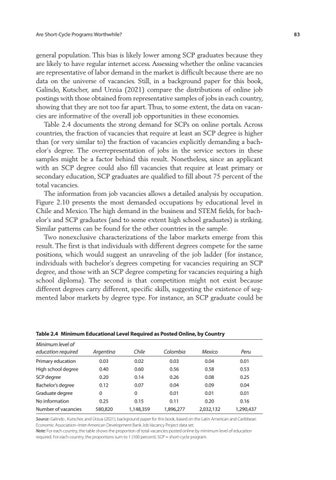83
Are Short-Cycle Programs Worthwhile?
general population. This bias is likely lower among SCP graduates because they are likely to have regular internet access. Assessing whether the online vacancies are representative of labor demand in the market is difficult because there are no data on the universe of vacancies. Still, in a background paper for this book, Galindo, Kutscher, and Urzúa (2021) compare the distributions of online job postings with those obtained from representative samples of jobs in each country, showing that they are not too far apart. Thus, to some extent, the data on vacancies are informative of the overall job opportunities in these economies. Table 2.4 documents the strong demand for SCPs on online portals. Across countries, the fraction of vacancies that require at least an SCP degree is higher than (or very similar to) the fraction of vacancies explicitly demanding a bachelor’s degree. The overrepresentation of jobs in the service sectors in these samples might be a factor behind this result. Nonetheless, since an applicant with an SCP degree could also fill vacancies that require at least primary or secondary education, SCP graduates are qualified to fill about 75 percent of the total vacancies. The information from job vacancies allows a detailed analysis by occupation. Figure 2.10 presents the most demanded occupations by educational level in Chile and Mexico. The high demand in the business and STEM fields, for bachelor’s and SCP graduates (and to some extent high school graduates) is striking. Similar patterns can be found for the other countries in the sample. Two nonexclusive characterizations of the labor markets emerge from this result. The first is that individuals with different degrees compete for the same positions, which would suggest an unraveling of the job ladder (for instance, individuals with bachelor’s degrees competing for vacancies requiring an SCP degree, and those with an SCP degree competing for vacancies requiring a high school diploma). The second is that competition might not exist because different degrees carry different, specific skills, suggesting the existence of segmented labor markets by degree type. For instance, an SCP graduate could be
Table 2.4 Minimum Educational Level Required as Posted Online, by Country Minimum level of education required Primary education High school degree SCP degree Bachelor’s degree Graduate degree No information Number of vacancies
Argentina
Chile
Colombia
Mexico
Peru
0.03 0.40 0.20 0.12 0 0.25 580,820
0.02 0.60 0.14 0.07 0 0.15 1,148,359
0.03 0.56 0.26 0.04 0.01 0.11 1,896,277
0.04 0.58 0.08 0.09 0.01 0.20 2,032,132
0.01 0.53 0.25 0.04 0.01 0.16 1,290,437
Source: Galindo , Kutscher, and Úrzua (2021), background paper for this book, based on the Latin American and Caribbean Economic Association–Inter-American Development Bank Job Vacancy Project data set. Note: For each country, the table shows the proportion of total vacancies posted online by minimum level of education required. For each country, the proportions sum to 1 (100 percent). SCP = short-cycle program.

